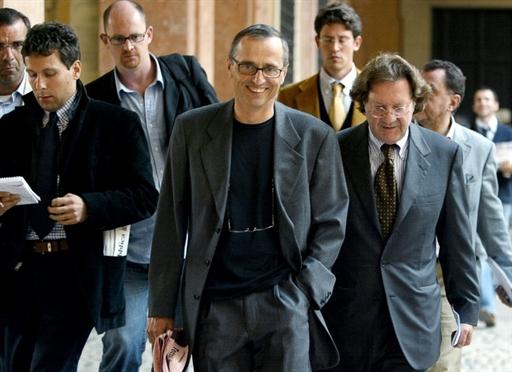Del Moral reveals doping programme at Spanish Federation, with Ferrari involved
Banned Spanish doctor says EPO and HGH were given to track riders ahead of 1996 Olympics

Luis García del Moral has admitted administering riders with EPO, growth hormone, and corticoids during his time as medical director of Spain’s national track cycling squad between 1993 and 1998, according to a report in Spanish newspaper El País on Tuesday. It is also revealed that the disgraced Dr. Michele Ferrari was involved in his work with the Spanish cycling federation (RFEC) during that period.
Del Moral received a life-time ban from sport for his part in the doping programme at the US Postal team, where he worked from 1999 to 2003, covering Lance Armstrong's first Tour de France victories. It was during a 2016 Court of Arbitration for Sport (CAS) hearing, in which former US Postal manager Johan Bruyneel was appealing his 10-year ban, that Del Moral gave the evidence revealed today in El País.
"Was there a doping programme in the Spanish national squad between 1993 and 1998?" Del Moral was reportedly asked, to which he replied: "Yes." Asked whether corticoids were administered to Spanish cyclists during that period, he said: "That wasn't the main thing. The main thing was EPO and growth hormone."
Asked whether Ferrari, also now banned for life, was involved in his work at the Spanish Cycling Federation, he said: "Yes."
El País reports that neither the Spanish Anti-doping Agency or the World Anti-Doping Agency (WADA), nor the UCI, have taken action to investigate further, despite all being aware of Del Moral's testimony. Neither he nor Ferrari can be newly sanctioned given the offences fall outside of the statute of limitations.
Del Moral's assertions were backed up by a confidential document published by El País, dated 15th July 1996, which breaks down his medical expenditure during that year. It was reported at the time that he had received nearly 14 million pesetas (€84,000) from the Spanish Cycling Federation that year – the year of the Atlanta Olympics – and the 12,866,729 pesetas detailed in the documents shows how that injection of funds was spent.
From the start of the year, 6m pesetas were spent on items filed under 'pharmacy'. More than 4m pesetas were paid to a 'Dr Ferrari' in two separate instalments. Ferrari did not respond to questions from El País.
Get The Leadout Newsletter
The latest race content, interviews, features, reviews and expert buying guides, direct to your inbox!
Despite being quoted at the time as saying he'd "managed to get Ferrari to work with us", former RFEC president Juan Serra played down the Ferrari associations when asked by El País. He did, however, acknowledge that they had received funds from the Spanish sports ministry to improve performances on the track, and that when he asked Del Moral how that money should be spent, Ferrari's name came up.
"We never employed Ferrari," said Serra. "I ran into him a couple of times and, yes, we paid him for some reports he did for the team, but nothing more. We would never have allowed him to dope riders."
Spain's best results on the track at the Atlanta Olympics were fifth place in the individual and team pursuits.
A few hours after the publication of the report, the RFEC issued a statement in response, saying: "In relation to the media reports that link the Spanish track cycling squad with illicit practices between 1993 and 1998, the Royal Spanish Cycling Federation states that neither our current administration nor any of the members of its sporting, technical, or medical departments have anything to do with the matters that have been reported.
"Furthermore, we underline that at present we do not have documentation that makes reference to said matters, that would allow us to provide more information or open an investigation. The Royal Spanish Cycling Federation is subject – like the other national sporting federations – to precepts of transparency and sound governance from the Consejo Superior de Deportes [sports ministry], and ensures compliance with the national and international regulations on the prevention, monitoring, and suppression of the use of prohibited pharmacological substances and practices, establishing an attitude of zero tolerance against doping. As such, the Royal Spanish Cycling Federation is committed to clean cycling and confirms the organisation’s battle, together with the Spanish Anti-Doping Agency, to eradicate these practices, both at elite professional level and among amateurs."
In another excerpt of Del Moral's testimony from the Bruyneel hearing, the doctor admits he "frequently" violated his professional obligations and doped "many" athletes during his career. Asked if he did it for the money, he said: "And because it was part of the system."